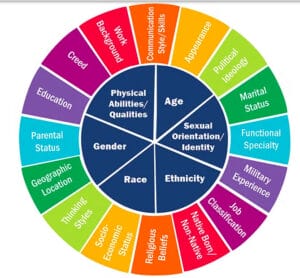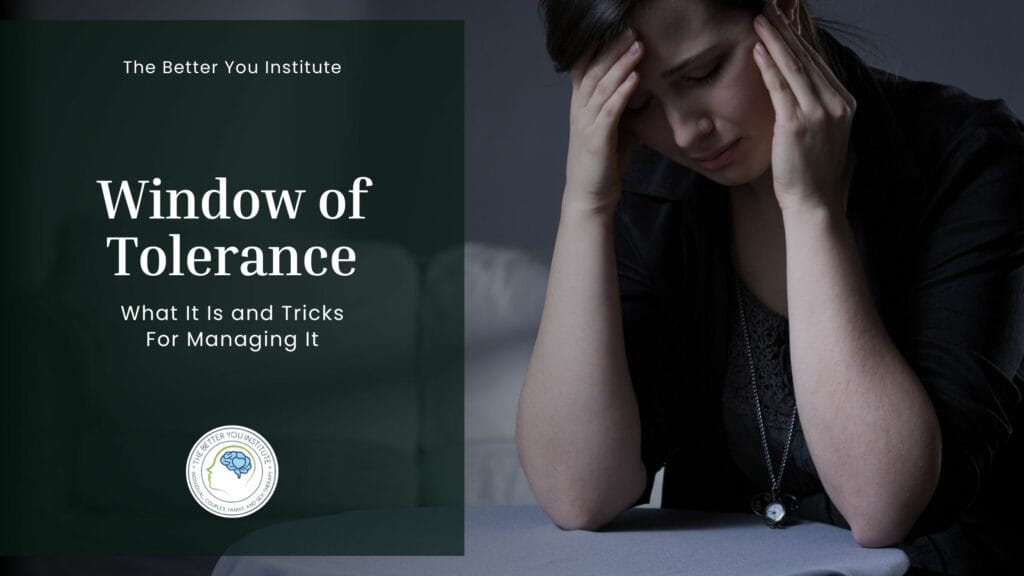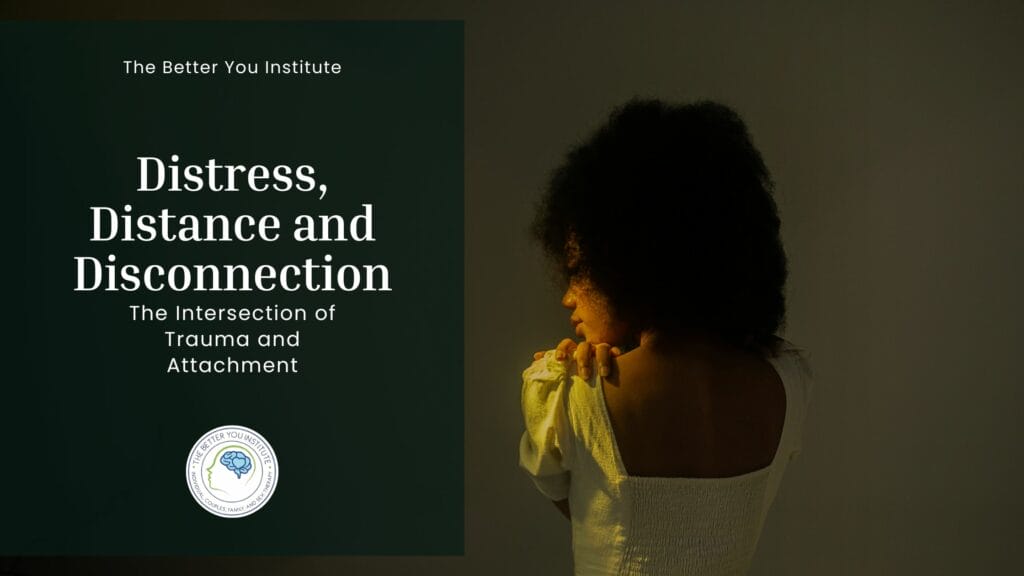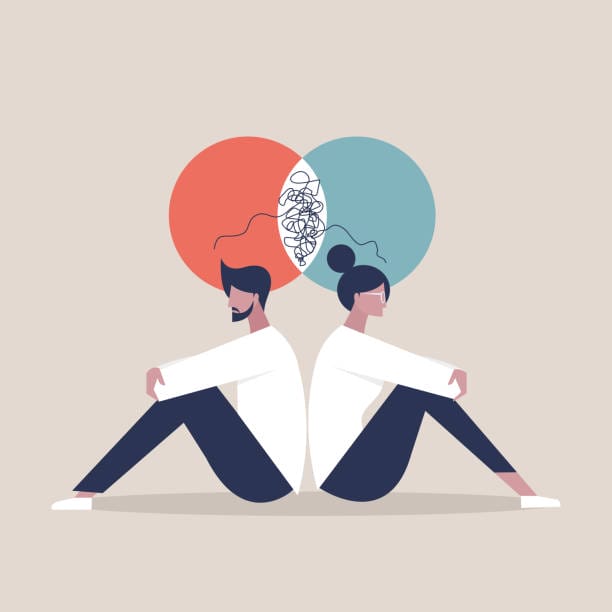When you cried as a child, did someone hug you, scold you, hit you, or ignore you for hours, sometimes days? Hopefully hugged, but if you are reading this, more likely scolded, hit, or ignored you. As a child, your brain is a lump of clay waiting to be sculpted by your caregivers and environment. You’re born with specific characteristics already; maybe you’re more naturally easygoing, cheery, or relaxed. Still, how these characteristics express themselves is determined by your experience with the world and other people. In short, this malleability humans have is why childhood abuse continues to affect you. Childhood trauma shapes who you are throughout your development. It influenced your belief about yourself and others, and changed your neurobiology (Yes! Trauma can change the shape of certain structures in our brain and how the brain functions.)
Before we go into why childhood abuse still affects you today, let’s define the different types of abuse you may have encountered. As a warning, some things in this article may be triggering.
Table of Contents
Abuse Definitions:
- Emotional abuse: Manipulative tactics used to control an individual which is harmful to their mental health, such as humiliating your child, screaming in your child’s face, not giving your child space to regulate themselves, violations of privacy (listening to your child’s therapy sessions), demanding perfection
- Physical abuse: Causing someone physical harm through excessive force, such as by choking, a punishment that leaves marks, burning, or inducing medical issues (e.g., withholding insulin or serving foods that will knowingly spike blood sugar)
- Verbal abuse: Utilizing words primarily to hurt someone’s mental health, such as calling your child names, saying extremely hurtful things (e.g.,that you don’t love your child, telling a child that they are a terrible person or that they have a lousy personality
Childhood abuse may affect individuals in different, unique ways, but here are some common effects:
- Low self-esteem
- Trouble trusting others
- Uncomfortable with intimacy
- Triggered by people/environments related to the abuser (A trigger is an emotional reaction that seems disproportionate to the current situation due to a reminder of the past trauma)
- Withdrawal from people
- Trouble getting/maintaining relationships
- Suicidal Ideation
- Getting into abusive relationships as adults
- Depression
- Anxiety
- Settling for less than you deserve
- Feeling broken
- Perfectionism
- Worrying people won’t believe you even if you are telling the truth
- Assuming that people think negatively about you
- Nightmares
- Spacing out/ attention difficulties
- Substance abuse issues
- Trouble setting boundaries
- Attachment issues
- Being emotionally numb
- Flashbacks
- Hypervigilance
- Difficulty being authentically you due to shame or fear (of not being accepted or being punished)
- Codependency/people pleasing
- Executive functioning issues: lack of focus, inability to multitask, sentence completion difficulty, organization/time management issues
Case example of childhood abuse and its effects:
Melissa’s parents were both abusive to her when she was a child. Her father often would purposefully try to humiliate her in front of her friends by reading her diary aloud and laughing. If Melissa did anything interpreted as “disrespectful,” her father would yell loudly in her face pointing his finger, and if she tried to take space, he would not let her leave by holding onto her arm. Her mother would call her curse words and slap her hard, often over nothing and leaving marks.
As an adult, Melissa does not trust others to respect her personal space or feelings. She is also easily triggered in relationships making it hard to maintain them. Due to being put down so often, she did not develop healthy self-esteem/image.
Neurobiological changes caused by childhood abuse:
If you encountered childhood abuse, your system was likely flooded with a stress reaction known as fight or flight response, which can have a significant effect on the brain. The constant flow of cortisol due to being stuck in a fight, flight, freeze, or fawn can damage parts of the brain. The main parts damaged or changed in the brain from childhood abuse are the hippocampus, prefrontal cortex, and amygdala. These changes in the brain can have long-term effects into adulthood, which include difficulty with emotion regulation, memory issues, and trouble with concentration.
Epigenetically (epigenetic refers to how your environment and behaviors affect your genes), childhood abuse can cause changes in gene expression related to chronic depression. Research also shows that trauma, such as childhood abuse, can lead to more susceptibility to disease and dementia. In women, chronic stress can lead to irregular menstrual cycles.
How to support a loved one who still suffers from the childhood abuse they endured
What not to do and say
If you have not experienced trauma, it may be hard to understand. For someone who hasn’t experienced trauma, “just choosing happiness” might work. However, for someone with trauma, this is easier said than done and may be triggering because it further invalidates their experience. Recognize that childhood abuse survivors have had a type of childhood that you have the privilege of not knowing. Therefore, you will have blind spots and may struggle with empathizing. Try to recognize these blindspots and when you’re not quite able to understand the other person’s experience. For instance, maybe you can seek help from your parents during emotional or financial needs. Some people who have experienced childhood abuse can’t. This automatically makes life much scarier. In another instance, it could positively impact your relationship with them if you can acknowledge that your friend/family member’s inability to organize their day and projects may be due to trauma symptoms. You may also increase empathy (rather than anger or frustration) for them.
Below are examples of what not to say and phrases you could say instead so someone who has childhood trauma:
|
Instead of saying… |
Say this… |
|
“Just choose to be happy” |
“I can only imagine how hard it must be to battle trauma related symptoms” |
|
“You have to leave your past in the past” |
“I understand that it is not possible for trauma to just go away” |
|
Ignore the situation completely |
Ask if the person wants to share |
|
Inducing shame or blame by saying, “It’s not fair that I also have to deal with tip-toeing around your symptoms” |
“I want to support you but sometimes I feel overwhelmed with not having the energy to.” |
|
Getting angry and acting on your frustrations in negative ways |
Try to remind yourself that this person is worth the extra patience it might take to give space for them to regulate themselves after being triggered |
|
“People have had it worse.” We can’t compare traumas. Everyone has different resources to heal and be resilient. The changes that occur after trauma can be measured in the brain. |
“It is not your fault that you have been affected by your trauma” |
|
Question or minimize their experience |
“I believe you” or “That is so much to go through!” |
Trauma Triggers
You may feel that it is unfair that you have the additional stress of coping with triggers throughout your day and it is unfair! Unfortunately, it is a fact of the matter. In the following paragraphs I will describe what triggers are, common triggers for survivors of childhood abuse, and a case example of someone with a trauma history and how they can have a corrective experience.
What is a trigger?
Being triggered is an overstimulated state a person can go into when reminded of past trauma. Someone who grew up in an abusive environment may be triggered every day, multiple times a day, and not even know it.
Examples of common adult triggers from childhood abuse:
- Socializing for longer than you have the energy for
- Criticism
- Being blamed
- Unfairness
- Being touched
- Intimacy
- Any perceived betrayal or abandonment
- Feeling invalidated
- Specific times of day or times of year
- Other’s strong emotions
- Reminders or seeing your parents
- Being in a situation where you need support (emotional or financial)
- Sensations
- Media
- Any similar situation to the abuse you experienced
How did triggers get in place and what do they look like in adulthood: Case example
Melissa’s mother was emotionally abusive to her throughout her life. A common subject that would send her mom into a rage was house chores. Once Melissa reached a certain age, her mom expected her to know that she needed to start doing the majority of housework and to know how to do it without instruction. When Melissa inevitably failed to meet expectations, her mom would rage at her, calling her lazy and a bad kid who was purposefully not trying. As an adult, Melissa becomes triggered whenever her husband asks her to help with chores. She feels blamed, criticized, and thinks that her husband is being unfair. This occurs even if her husband is not angry about chores but simply needs help.
A corrective experience for Melissa:
It is highly likely that over the years of Melissa getting triggered when her husband needs help, fights have ensued between the two of them. In a healthy relationship, neither partner wants to hurt the other or be hurt. Melissa’s husband can voice his frustration in a non-triggering way by using some of the lines in the above table. By coming at the situation in a warm and empathic way, Melissa will feel safe enough to disclose how she is feeling – scared, unsafe, retraumatized, blamed, and criticized. Her husband can validate her feelings at the moment and sit in the emotion with her without minimizing or dismissing Melissa. When Melissa feels less triggered, she can ask her husband about his experience and hold space for him to need help. By going through this process, Melissa can learn to separate her husband in her adulthood from her mother in her childhood, where she can see her husband is just asking for help rather than putting demands or criticizing Melissa.
What is an abuse cycle?
There are different types of abuse cycles: repeating the abuse that happened to you by abusing someone else or an abuse cycle that occurs within one relationship on repeat. The latter cycle typically looks like this: honeymoon stage, rising tension, explosion, then back to the honeymoon phase only to repeat. In a relationship with a narcissist, this cycle may involve love bombing.
Repeating abuse cycles
Whether receiving or acting out abuse, people who encounter childhood abuse may be more likely to continue the cycle. Our relationships with our caregivers, as we grow up, shape what we come to believe love is. A helpful tool in psychotherapy is to explore early childhood bonds, especially at pivotal development stages, to best understand how you see the world and your place in it. For example, if love equaled pain for you growing up, whenever you are in a painful dynamic, you might feel “at home” and not realize it’s an unhealthy dynamic. Your therapist can pick up on this pattern and point it out to you, having taken your family history. Also, feeling “at home” may be a warning sign, as these painful dynamics are what you are seeking to change. Please remember this is not always the case, but it frequently is.
What do I do to get out of an abuse cycle?
Look for red flags
- Moving too quickly
- Not respecting boundaries
- Too intense too soon (saying I love you after two weeks)
- Not feeling validated after conversations
- Pressured for sex
- Feeling confused about your perception of reality, gaslighting
Through childhood abuse we are programmed for abuse to feel like “home” to us. Therefore, it might require patience with yourself during the learning curve of finding the right partner. Educating yourself on what a healthy relationship looks like is key. For example, you may want to find resources to understand what boundaries are, what healthy boundaries look like in a relationship, and how to implement them.
Recognize how the childhood abuse has impacted you
Remember, our childhood is a very formative time in our lives. It is unrealistic to think that if you experienced childhood abuse you are unscathed from these experiences. If you struggle to see that you carry trauma, this denial of your trauma may be a protective measure. Below are common areas in which people with a history of childhood abuse seem to struggle.
Struggles with Identity
Ideally, our parents help us develop our own separate identities so we can be healthy adults. However, abusive parents aren’t typically attuned to your thoughts or feelings. You can sometimes just be seen as an extension of your caregiver’s sense of Self. They can’t imagine that you have thoughts or feelings separate from theirs. Sometimes, there isn’t enough reflection of what you are feeling or about your likes or dislikes. In fact, they may tell you what you like/dislike, leading to a false sense of Self.
How do I find my identity?
-
Try an identity wheel which is a visual that covers various aspects of identity.

-
Write a list of your likes and dislikes and mindfully think if these are your likes/dislikes or if it’s your false self developed from scripts your parents fed you. A helpful tool to this one is when you hear your likes and dislikes in your head, pay attention to whose voice is speaking them. Is it your own or someone else’s?
- Pick out your values from a values list and try to live within them.
Perfectionism
Abusive parents often don’t have realistic expectations of you. Hence the unwarranted, inappropriate emotional/physical consequences to your actions. A lot of times you’ve done nothing wrong at all. To avoid the emotional or physical consequences of your parent’s inability to manage their unrealistic expectations of you, you seek to be perfect, or at least reach the expectations your caregivers set out for you.
How do I know if I struggle with perfectionism?
- Do you rework projects beyond what’s needed?
- Even after you’ve reworked the project several times are you still not satisfied with the quality of work or the end result?
- Do other people tell you that you did a great job but you don’t believe them?
- Does/did getting a 98 on a test send you into a shame spiral?
- Do you sacrifice your relationships to spend more time getting a project “right?”
How do I stop being a perfectionist?
- Practice talking to yourself like how you would talk to a friend (no reason you are less deserving of kindness)
- Recognize the reason for needing to be “perfect.” Perfectionism was a way for you to survive in an unsafe environment
- Remind yourself you are in a safe environment now
- Understand that “perfect” doesn’t actually exist
- Operating at 75 percent is sometimes enough: good enough is good enough
Struggles with Career
As a child, it may have been difficult to imagine having a future. It might have felt like the pain would last forever. With that in mind, planning for the future such as for a career, might not have been a focus. Additionally, it can be hard to accomplish goals while struggling with PTSD symptoms. Lastly, if you have not fully developed your true Self or identity it can be hard to know what career would suit you. Something to try might be a valid career assessment like the Holland Code or a personality test like The Big Five-Factor Test (bear in mind that this test may be less accurate outside of western, industrialized countries). These assessments can help guide you in the right direction to figuring out the best suited career for you. You may also benefit from processing through the pain that you experienced in childhood to free yourself to new opportunities in adulthood, including having a career.
Issues with Attachment
When our parents meet our needs of feeling loved and cared for in childhood, we typically develop a secure attachment. However, abuse survivors can form a disorganized attachment (also known as fearful-avoidant). Disorganized attachment occurs when your source of caregiving is also your source of fear. Children with this attachment may do confusing things like walking toward the caregiver but with their heads turned the other way.
What does disorganized attachment look like in adults?
- Conflicting feelings of wanting closeness yet avoiding it
- Negative view of self and others
- Chaotic, unpredictable, and intense relationships
- Trouble disclosing feelings
- Issues with vulnerability
- Attraction to partners who are unavailable or abusive
- Push and pull in relationships
What do I do if I think I have disorganized attachment?
- Work on tolerating vulnerability
- Practice communicating feelings
- Challenge negative inner dialogue
- Give yourself space to process feelings and thoughts
- Learn what a healthy relationship looks like
Childhood abuse has measurable, observable effects on mental health, personality, and brain function. Hopefully, this article has explained why you are still coping with symptoms due to childhood abuse and has empowered you to start making changes to improve how your abuse impacts you. It is hard to heal from childhood abuse symptoms without the support of a mental health professional. Seeking help might be extra hard for you, but it is a brave step. You have survived so much, you are stronger than you know. If you, or someone you know, is a childhood abuse survivor and wants help and support in your healing process, please reach out. We have specially trained therapists that are trauma-focused in their work. Call us today at 267-495-4951.







